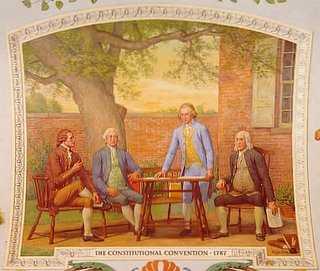Related Topics
Philadelphia Legal Scene
The American legal profession grew up in this town, creating institutions and traditions that set the style for everyone else. Boston, New York and Washington have lots of influential lawyers, but Philadelphia shapes the legal profession.
..The Constitution
Our Constitution was not a proclamation written by a convention. It was a negotiated contract for uniting thirteen sovereign independent states. Nothing like that had ever been done voluntarily, and few nations have matched it in two hundred years, even with the use of force.
Patent Pending

|
| Constitution |
Most of the members of the Constitutional Convention of 1787were also members of the early Senate and Congress during the time when Philadelphia was seat of government. The Constitution had made provision for copyrights and patents "for a limited time", and the early Congresses fixed a reasonable time as seventeen years. A couple of years ago, Congressman Bono sponsored a law, widely supposed to be for the benefit of her constituent Walt Disney extending the time to 99 years. Since the creation of monopolies for a limited time was stated to be for the purpose of encouraging innovation, lawsuits were promptly filed with the contention that 99 years was essentially unlimited, and in any event, would throttle innovation. In the Eldred case, the U.S. Supreme Court reluctantly held that it was up to Congress to decide how long was a limited time, meanwhile expressing its dismay at the earlier Congress which had allowed the time to be so extended by what is widely reported to be a log-rolling contest among lobbyists. The disgust of the Supreme Court was very thinly disguised in its opinion, which quite obviously hoped for Congress to take another look at what it had done.
So now the question arises, of how such a strange provision got to be in the Constitution in the first place. The >members of the convention were mostly farmers and plantation owners, quite recently returned to civilian life after struggling with King George III over governmental intrusion into trade and commerce. Why ever would these people, who were otherwise so parsimonious in their rules and principles, think to intervene in patents and copyrights? It has been suggested that Thomas Jefferson, who was a writer and an inventor, might have been the source of this provision. Unfortunately, Jefferson was three thousand miles away during all of the Constitutional Convention, and was quite dismayed with the completed Constitution when he later returned.
It's a job for some graduate student in American History, looking around for something to write his thesis about. James Madison kept extensive secret diaries of the interior arguments at the Convention, and Benjamin Franklin's Collected works run to over eighty volumes. Surely, among all those scribblings by quill pens, can be found some revealing references to the originator of the bizarre little patent clause. And if it turns out to have been anyone except Ben Franklin, it will be a great surprise. Surely there is a broad hint in the fact that for many years the Franklin Institute essentially was the U.S. Patent Office. Just think for a moment of the value of holding a patent on the invention of electricity. Makes Microsoft seem rather trivial. And as for a comparison with Mickey Mouse, well, really.
Originally published: Monday, June 26, 2006; most-recently modified: Friday, May 31, 2019